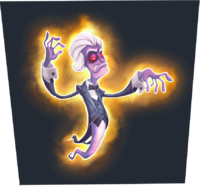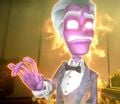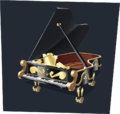Amadeus Wolfgeist: Difference between revisions
No edit summary |
|||
| Line 30: | Line 30: | ||
|Jap=ナルシェスベン | |Jap=ナルシェスベン | ||
|JapR=Narushesuben | |JapR=Narushesuben | ||
|JapM= | |JapM=Portmanteau of "narcissist" and "thespian", and/or possibly "{{wp|Ludwig van Beethoven|Beethoven}}" | ||
|Ita= Ivan Spettrinsky | |Ita=Ivan Spettrinsky | ||
|ItaM= Pun on | |ItaM=Pun on {{wp|Stravinsky}} and "spettro" (spectre) | ||
|Dut=Von Vreeshoven | |Dut=Von Vreeshoven | ||
|DutM=Pun on "Ludwig van Beethoven" and | |DutM=Pun on "Ludwig van Beethoven" and "vrees" (fear) | ||
|Ger=Tasten-Torsten | |Ger=Tasten-Torsten | ||
|GerM=From "tasten" (keys) and the name "Torsten" | |GerM=From "tasten" (keys) and the name "Torsten" | ||
|FreA=Faust Note | |FreA=Faust Note | ||
|FreAM=Pun on | |FreAM=Pun on "fausse note" (wrong key) and likely a reference to the opera {{wp|Faust (opera)|Faust}} by French composer {{wp|Charles Gounod}} | ||
|FreE= Faust Knot | |FreE= Faust Knot | ||
|FreEM=Pun on | |FreEM=Pun on "fausse note" (wrong key) and likely a reference to the opera Faust by French composer Charles Gounod | ||
|Kor=나르세스벤 | |Kor=나르세스벤 | ||
|KorR=Nareuseseuben | |KorR=Nareuseseuben | ||
Revision as of 03:42, January 21, 2024
| Amadeus Wolfgeist | |
|---|---|

| |
| Floor | The Great Stage |
| HP | 450 |
Amadeus Wolfgeist is the fifth boss in Luigi's Mansion 3. His name is based on that of famous composer Wolfgang Amadeus Mozart. He is encountered on the fourth floor of The Last Resort. Defeating him rewards Luigi with the elevator button that grants access to Castle MacFrights and allows him to free one of the imprisoned Toads that Wolfgeist had in his possession.
Appearance
Amadeus Wolfgeist is an elegantly dressed purple ghost bearing an appearance to that of a normal pianist. He has silverish-gray hair that is mostly straight except for the back of his hair. When he is angry, his aforementioned hair unravels into a mess, with flames seemingly appearing near it.
Battle
Luigi finds a piano playing by itself, as well as Toad’s portrait on the stage. He attempts to get on the stage, but Wolfgeist appears and, upon noticing Luigi, briefly gets mildly annoyed at his presence and proceeds to rapidly play the piano to scare Luigi off the stage, smirking once he did so. Upon seeing that Luigi evaded his chair attack, he will express displeasure before resuming playing the piano to summon Goobs posing as ballerinas. After the Goobs are defeated, he then lashes out and proceeds to confront Luigi personally by possessing his piano.
The first phase requires that the player dodge various levitating seats as Wolfgiest is playing the piano. It is done in sets of three, though in the final portion, all six remaining sets are levitated and thrown.
The second phase requires the player to confront Goobs posing as ballerinas. A pair of Goobs appear initially. As they are wearing ballet masks, they are initially immune to the Strobulb, requiring that the player knock them off before flashing them and sucking them in. Amadeus will then summon three more, with the rest of the phase requiring defeating them.
The third phase has Luigi fight Wolfgeist himself. He will possess his own piano and attempt to pounce on Luigi. He will eventually leap high into the air, causing a shockwave as he lands that Luigi must dodge with a burst. The piano opens up, leaving him vulnerable to a Strobulb flash. Once blinded, Wolfgeist will move his piano to the stage and launch bombs at Luigi. Luigi must then throw a bomb into the piano lid, causing it to tip over to allow Luigi to use the Suction Shot at it and then forcibly yank it onto the floor; the piano will be destroyed the third time Luigi does this. After being extracted from the piano, Wolfgeist will be exposed and try to grab or burn the player, although he can easily be stunned with the Strobulb and then sucked in. He then repossesses the piano and will launch a barrage of piano keys (how many shots depending on how much health he has lost by that point), though he otherwise has the same attack pattern. Once he is defeated, he will formally bow before letting himself be sucked in. Luigi will then retrieve both the elevator button that grants access to Castle MacFrights as well as freeing Toad by using the Dark-Light Device, with Polterpup activating the steps to allow Luigi up.
Gallery
Names in other languages
| Language | Name | Meaning | Notes |
|---|---|---|---|
| Japanese | ナルシェスベン[?] Narushesuben |
Portmanteau of "narcissist" and "thespian", and/or possibly "Beethoven" | |
| Chinese | 奈爾莎士賓[?] Nài'ěrshāshìbīn |
Transliterated from the Japanese name | |
| Dutch | Von Vreeshoven[?] | Pun on "Ludwig van Beethoven" and "vrees" (fear) | |
| French (NOA) | Faust Note[?] | Pun on "fausse note" (wrong key) and likely a reference to the opera Faust by French composer Charles Gounod | |
| French (NOE) | Faust Knot[?] | Pun on "fausse note" (wrong key) and likely a reference to the opera Faust by French composer Charles Gounod | |
| German | Tasten-Torsten[?] | From "tasten" (keys) and the name "Torsten" | |
| Italian | Ivan Spettrinsky[?] | Pun on Stravinsky and "spettro" (spectre) | |
| Korean | 나르세스벤[?] Nareuseseuben |
Portmanteau of "narcissism" and "Beethoven" | |
| Spanish | Almadeus[?] | Pun on "alma" (soul) and the name "Amadeus" (as in Mozart) |
Trivia
- The third phase of Wolfgeist's battle is similar to the battle against the Harsh Possessor from Luigi's Mansion: Dark Moon, in that they both try to attack Luigi with their respective vessel.
- The behavior is also similar to the Mad Piano from Super Mario 64, a connection to which Nintendo of Europe's Twitter made a reference.[1]
- During the battle's first phase, the music Wolfgeist plays on his piano is very similar to Ludwig van Beethoven's piano song Moonlight Sonata.
- Wolfgeist’s fingers are unusually long, which is likely a reference to the term "piano fingers," which is tied to an old saying that if one’s fingers are long, one should be good at piano.


